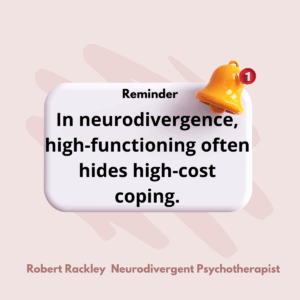
The High-Functioning Myth: When Neurodivergent Coping Looks Like Thriving
By Robert Rackley MSc MIACP
Neurodivergent Psychotherapist | ADHD & Neurodivergence Specialist
“You seem fine.”
It’s one of the most common phrases neurodivergent adults hear—especially those who appear successful, articulate, or outwardly “together.”
But often, what people call “high-functioning” is actually high-cost coping.
As a therapist specialising in ADHD and neurodivergence, I see this every day in my practice.
What Does “High-Functioning” Really Mean?
In the context of neurodivergent mental health, high-functioning usually means:
Overperforming at the expense of wellbeing
Masking distress in social or professional settings
Suppressing sensory, emotional, or cognitive needs
Burning out quietly, without visible disruption
For many neurodivergent people—including those with ADHD, autism, or dyspraxia—being “high-functioning” isn’t a strength. It’s a survival strategy developed over years of unmet needs, misunderstanding, and internalised shame.
Insight ≠ Mental Wellness
One of the biggest misconceptions in therapy is assuming that insight equals stability.
A client might be able to describe their anxiety, unpack their ADHD traits, and reflect deeply on their experiences. But that doesn’t mean they’re emotionally regulated, or even coping.
In fact, many neurodivergent clients have been praised for their insight while quietly unraveling behind the scenes.
Masking Is Not Healing
Masking—the effort to appear “normal” or hide neurodivergent traits—is often what creates the illusion of high-functioning behaviour.
It might look like:
Maintaining eye contact when it feels distressing
Suppressing stims to avoid judgement
Saying “I’m fine” when completely dysregulated
Meeting deadlines while in emotional shutdown
Masking is exhausting. And while it may help neurodivergent people navigate everyday life, it also leads to burnout, anxiety, and identity confusion over time.
Therapy for Neurodivergent Adults Must Go Deeper
In neurodivergence-affirming therapy, we move away from the surface-level question of “Are they functioning?”
Instead, we ask:
Are they regulated?
Are they safe in their body and relationships?
Are they masking to survive or expressing their authentic self?
Real support means making space for stimming, unmasking, and being “too much.”
It means challenging societal expectations of what wellness looks like.
You Deserve More Than Survival
If you’ve ever felt invisible because you were still performing—this is for you.
If your distress was overlooked because you were still managing—this is for you.
If therapy ever made you feel like you had to fit in before you could be helped—this is for you.
You don’t need to appear “high-functioning” to deserve support.
You don’t need to be calm, quiet, or neat to be taken seriously.
You don’t need to earn rest.
Final Thought
Let’s stop mistaking coping for thriving.
Let’s stop rewarding burnout with praise.
Let’s start creating spaces—both therapeutic and personal—where neurodivergent people can be real, not just resilient.
high-functioning ADHD, therapy for neurodivergent adults, neurodivergent burnout, masking in ADHD, affirming therapy, neurodivergent mental health, autism masking, ADHD support Ireland
